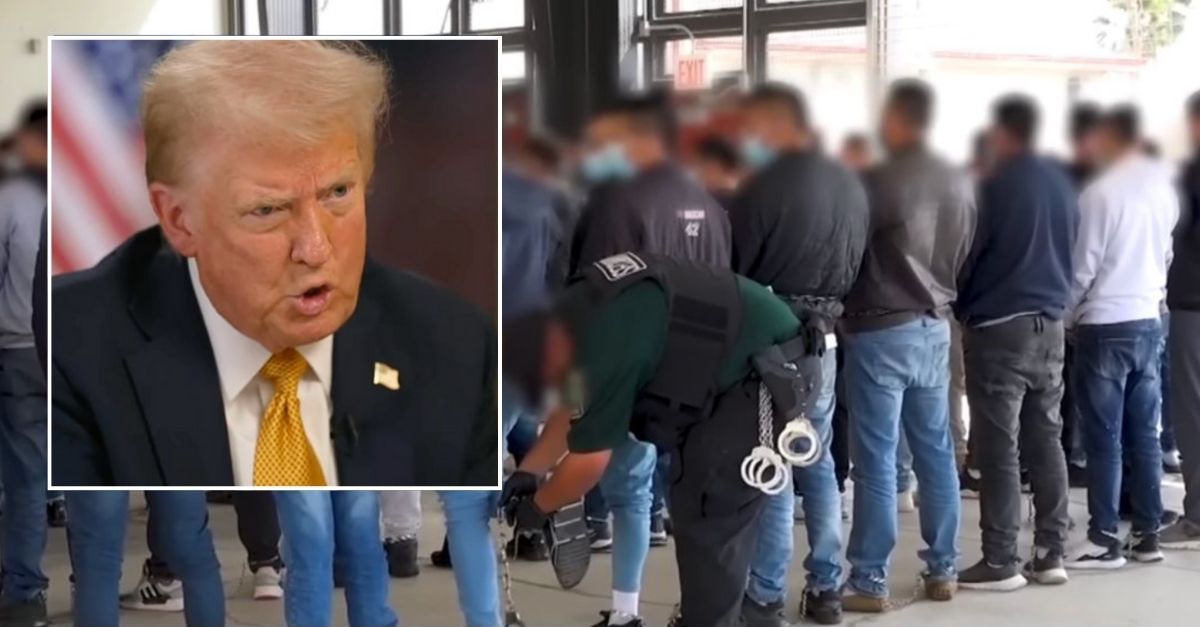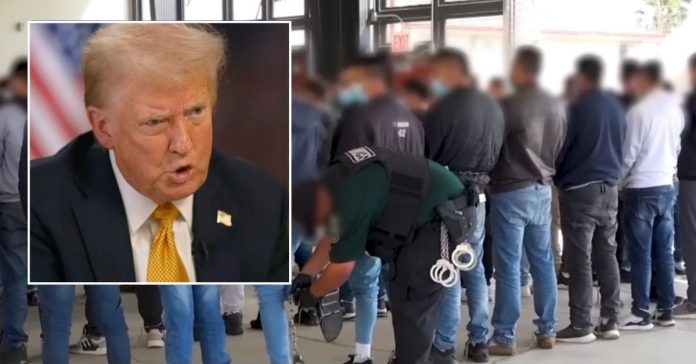
Inset: President-elect Donald Trump on “Meet the Press” Sunday, Dec. 8, 2024 (NBC News/YouTube). Background: U.S. Immigration and Customs Enforcement conducting a raid (Fox News/YouTube).
A federal appellate court on Friday declined to lift a nationwide injunction that bars the Department of Homeland Security (DHS) from carrying out President Donald Trump’s plans to summarily deport immigrants to countries where they are not from, allegedly without due process.
The 1st Circuit Court of Appeals issued the ruling in a two-page order, denying an emergency motion from the government for a stay of an April 18 preliminary injunction. The three-judge panel determined that DHS failed to satisfy the criteria required for such relief, and the court has “concerns regarding the continuing application of the Department of Homeland Security’s March 30 Guidance Regarding Third Country Removals,” among other things, according to the order.
“In particular, we have concerns regarding … the defendants’ filing of a ‘provisional’ stay motion three days before the injunction was entered; the irreparable harm that will result from wrongful removals in this context; the equities of stay relief; and certain merits-related issues that the parties are instructed to address in their briefs,” the court said.
The ruling stems from a class-action lawsuit filed by immigration advocates after DHS issued new guidance authorizing the removal of certain noncitizens to “third countries” not named in their immigration proceedings, and with which they allegedly have no historical or legal ties. The plaintiffs argued that the policy violates the due process clause of the Fifth Amendment, as well as obligations under the Convention Against Torture human rights treaty.
U.S. District Judge Brian Murphy, a Joe Biden appointee, barred the government from moving forward with the “third country” deportation plans in a sharply worded 48-page memorandum and order on April 18. “This case presents a simple question,” Murphy said. “Before the United States forcibly sends someone to a country other than their country of origin, must that person be told where they are going and be given a chance to tell the United States that they might be killed if sent there?”
In March, the Boston-based judge first issued a temporary restraining order barring deportations to third countries without a judge signing off on such measures, presupposing that the government had likely already, or likely would, run afoul of its obligations. Murphy issued the order on March 28 following a motion hearing, during which the court upbraided DOJ attorneys for arguing that the deportations “would not be violative of any policy or practice” under U.S. law or treaty obligations. A memorandum explaining the order followed the next day.
“In short, the Government expressed no concern that deportations in violation of the Convention Against Torture could be occurring immediately and regularly in the days until the preliminary injunction; the Court does not share the same disregard for probable due process violations protected by the Constitution and enumerated in both statute and treaty,” Murphy wrote.
Under Murphy’s injunction, the government was ordered to “provide written notice” to all immigrants and their attorneys about their proposed deportation destination, a “meaningful opportunity” to express fears that might occur in such countries under the torture convention, and an additional chance “to seek to move to reopen immigration proceedings to challenge the potential third-country removal.” An immigrant’s ability to challenge third-country removal must be granted with a minimum 15-day grace period, the judge said.
Colin Kalmbacher contributed to this report.

